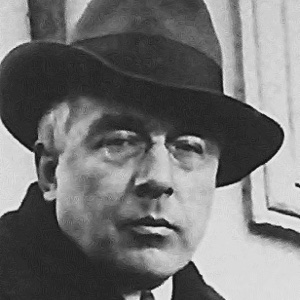
P. D. Ouspensky (1878 – 1947) was a Russian journalist, mathematician, esotericist, and writer. Uninterested from an early age in the ordinary knowledge of the world, Ouspensky traveled in Europe and the East in his search of a different kind of knowledge. In 1915 he met G. I. Gurdjieff, who he studied with for several years before moving to London in 1921. Here he gave lectures until moving to America in 1941 in order to avoid the war in Europe. Ouspensky’s first major work was Tertium Organum, which was published in 1912. His book In Search of the Miraculous is an account of his time with Gurdjieff.

Quotes by P. D. Ouspensky…
Each minute, each moment, man is saying or thinking ‘I’. And each time his ‘I’ is different. Just now it was a thought, now it is a desire, now a sensation, now another thought, and so on, endlessly. Man is a plurality. Man’s name is legion.
We are surrounded by a wall built of our conceptions of the world, and are unable to look over this wall at the real world.
If men could see their true position and could understand all the horror of it, they would be unable to remain where they are even for one second. They would begin to seek a way out and they would quickly find it, because there is a way out, but men fail to see it simply because they are hypnotized. Kundalini is the force that keeps them in a hypnotic state. “To awaken” for man means to be “dehypnotized.”
Awakening begins when a man realizes that he is going nowhere and does not know where to go.
I had come to the conclusion a long time ago that there was no escape from the labyrinth of contradictions in which we live except by an entirely new road, unlike anything hitherto known or used by us.
If he carries out all these rules while he observes himself, a man will record a whole series of very important aspects of his being. To begin with, he will record with unmistakable clearness the fact that his actions, thoughts, feelings, and words are the result of external influences and that nothing comes from himself. He will understand and see that he is in fact an automaton acting under the influences of external stimuli. He will feel his complete mechanicalness. Everything “happens,” he cannot “do” anything. He is a machine controlled by accidental shocks from outside. Each shock calls to the surface one of his “I’s.” A new shock and that ‘I’ disappears and a different one takes its place. Another small change in the environment and again there is a new ‘I.’
There is nothing new in the idea of sleep. People have been told almost since the creation of the world that they are asleep and that they must awaken. How many times is this said in the Gospels, for instance? “Awake,” “watch,” “sleep not.” Christ’s disciples even slept when he was praying in the Garden of Gethsemane for the last time. It is all there.
Another thing that people must sacrifice is their suffering. It is very difficult also to sacrifice one’s suffering. A man will renounce any pleasures you like but he will not give up his suffering. Man is made in such a way that he is never so much attached to anything as he is to his suffering. And it is necessary to be free from suffering. No one who is not free from suffering, who has not sacrificed his suffering, can work. Later on a great deal must be said about suffering. Nothing can be attained without suffering, but at the same time one must begin by sacrificing suffering. Now, decipher what this means.
Energy is spent chiefly on unnecessary and unpleasant emotions, on the expectation of unpleasant things, possible and impossible, on bad moods, on unnecessary haste, nervousness, irritability, imagination, day-dreaming, and so on. Energy is wasted on the wrong work of centers, on unnecessary tension of the muscles out of all proportion to the work produced, on perpetual chatter which absorbs an enormous amount of energy, on the “interest” continually taken in things happening around us or to other people and having in fact no interest whatever, on the constant waste of the force of “attention,” and so on, and so on.
Unless he attains inner unity man can have no ‘I,’ can have no will. The concept of “will” in relation to a man who has not attained inner unity is entirely artificial. The whole of life is composed of small things which we continually obey and serve. Our ‘I’ continually changes as in a kaleidoscope. Every external event which strikes us, every suddenly aroused emotion, becomes caliph for an hour, begins to build and govern, and is, in its turn, as unexpectedly deposed and replaced by something else. And the inner consciousness, without attempting to disperse the illusory designs created by the shaking of the kaleidoscope and without understanding that in reality the power that decides and acts is not itself, endorses everything and says about these moments of life in which different external forces are at work, “This is I, this is I.”
